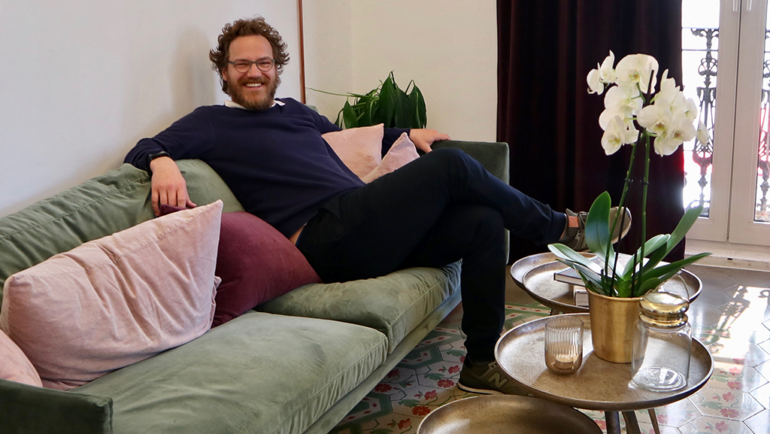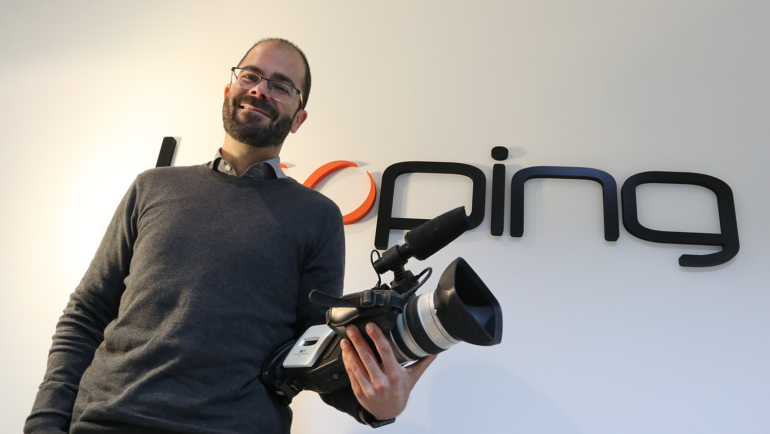8513Views 0Comments
“It’s the saddest sight I know, seeing a bunch of friends together, young people, sitting around a table, but instead of talking to each other they are just staring at their phones,” Daniele Antoniani says.
Yes, it is sad. And it’s not only young people. We oldies too increasingly tend to spend valuable together-time staring down on a small screen, or compete at dinner parties to show the funniest video of a panda falling down a hill.
That is not the way we should be using the smart phone, “this small device that opens up the world” as Antoniani calls it. Instead of allowing it to isolate ourselves from other people, we should be using it to connect with them, to learn, and of course to grow our businesses.
“There’s a gap in the teaching of how to use this new technology properly” Antoniani argues.
“I’m lucky to be old enough to have started with the good old desktop. This enabled me to see the internet merely as a tool. But the young kids have only ever known the phone. They live through it but don’t really know how to use it,” he shakes his head sadly.
We are sitting, talking face to face in real time, in Antoniani’s office in El Sindicat. By a stroke of luck, this interview is a ‘toofer’ – a ‘two for one’ – as his partner-in-the-opposite-of-crime, Joe Poehlein, is also here to tell me all about their plan to help people through technology.
“Did you know that the online gaming industry generates 118 billion US dollars a year?”
Wow! The 2.50 euros I paid a year ago to avoid adverts while playing online Scrabble is part of that?!?
The two exchange looks. Yes, I know, most online gamers probably pay a little more than that, and it’s not Scrabble they are playing, but guys shooting other guys on top of Aztec pyramids. They probably also spend rather more time on online games than the 10 minutes I manage to fit in before bed.
“Yes, the real gamers spend hours a day,” Poehlein agrees. “They love playing, but deep down they know that they are probably wasting their time to a certain degree. Now we can help them feel better about the time they spend online.”
Help gamers feel better about themselves? Is it an app?
“It’s a charity! A non-profit organisation!” Antoniani enthuses. “It’s called Play For Life [LINK].”
“Let’s say that as little as 0.5% of the money gamers spend on online games goes to Play for Life; not out of the gamer’s pocket by asking them for donations, but from the money they have already paid for the product, as part of the company’s policy. 0.5% of 118 billion US dollars – that’s millions and millions! Think of how many people we can save, only by for example providing clean water!”
“But this is not a handout. We are not like those NGOs that all work along the same lines: Raising money with a sponsor, asking for money at fundraisers, basing all their actions on asking for money. And when the money is collected, who knows where it ends up?” Poehlein explains.
“We will concentrate on helping people to help themselves, primarily by establishing special schools to teach children how to use technology. And because it all happens online, we will have 100% transparency.”
“And imagine how much better the gamers will feel when they win a game; instead of seeing on the screen “You have won 1000 points!” or “You have won $100!” they will now see: “Congratulations, you have saved the life of a child!”” Antoniani smiles.
“This will also raise the image of the games studios. And then other companies will want to be in on it too.”
In fact, the Play For Life pair, who do all the work in their spare time and get most of their ideas while taking long walks together, want to concentrate only on the positive. They think rather than appealing to people’s guilt feelings about spending too much time online or about “the poor children in Africa”, it’s better to show the positive outcome.
“Here is our website,” Antoniani turns on a desktop. “You see here, instead of a photo of a starving African child with big, teary eyes, our landing page shows something positive: A photo made to look like a colourful work of art: Smiling children concentrating on studying, using phones to educate themselves. And the font is in something closely resembling child-like handwriting – this way we create a light, positive, playful feeling. Joe created the website. He’s the tech guy and I have the vision and the contacts.”
Daniele Antoniani, born in Rome, knows the gaming industry well, having spent almost 10 years in Moscow working as a business developer of online games after having worked in the at the time fledgling online dating industry.
“This was before smart phones; I suppose online dating was still a bit frowned upon. Especially in Italy!” he laughs. “Guys would say – what? You can’t get a girl just by dressing smart, being cool and shouting ‘Ciao, bella’ from a Vespa? In that respect, I would say Russians were actually more open. But now of course, all the stigma has disappeared from online dating.”
In fact, he met his Chinese girlfriend by being an advisor for the dating industry. He saw her profile while he was trying out the Chinese dating app TanTan in Rome. She was on holiday in Rome… and the rest is modern-day romance history. Soon she is coming to Mallorca to live.
“And that is the proper use of modern technology,” he laughs. “Anyway, my time in Moscow allowed me to make contacts in the gaming world, so that side of the business is already in the bag. Our only challenge now is to find a good teaching organisation on the ground in Africa, and we’re away!”
Poehlein nods. “We have everything in place. We have the same values and the same vision. We are passionate about this project. And we can work on it while strolling down the Paseo Maritimo! Or sitting on the beach!”
Poehlein’s mother is Mallorquin, so although he grew up in a small town in Indiana, he has always had a connection to the island. But he never thought he would live here until 2013 when he graduated from college in Indiana with a computer degree. There were no jobs to be had near him, and his father suggested going to Mallorca to work.
“Wow! Living in Mallorca, it had never occurred to me. But then I thought, why not?“ Poehlein laughs.
Before settling on the island, initially staying with relatives, he was a bit sceptical.
“I thought the place would be only about tourism, like the whole island would be a big resort. But as soon as I arrived, I fell in love with Mallorca!”
Antoniani is just as enthusiastic about his new home, saying there’s a much better business atmosphere here than in Italy.
“It’s the best place in the world!” he says simply.
“It’s like magic – as soon as I arrived, everything started going in the right direction,” Antoniani, who was headhunted here by a marketing company, says.
“I want to stay forever. I like the slower pace of life, and that Palma is a small city with all the benefits of a big one!”
Poehlein agrees, and then they go off together on another long walk in the sun, getting new ideas for how they will improve the lives of thousands, with technology.
On my way home, I stop at a restaurant for a café con leche. At the table next to mine is a young family; father, mother and a toddler in a pushchair. The child is straining against his harness; his eyes darting eagerly between the two parents’ faces. But they don’t see him. They are too busy looking at their phones.


